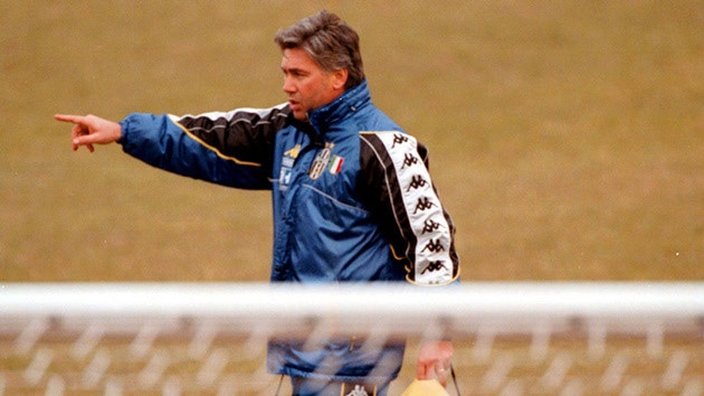“The world’s big things only can be done by paying attention to their humble beginnings.” Laozi
On 17 May 1992 at the San Siro, Italian midfielder Carlo Ancelotti left the pitch for the last time as a professional footballer. His farewell was befitting of a player who had won almost every trophy available at club level — a 20-minute cameo appearance in front of the AC Milan fans in which he ended up scoring twice. Blighted by injuries, Ancelotti retired after the 4-0 win over Hellas Verona, soaking in the adoration of supporters. He was left to contemplate what the future would bring, and how he would cope without the rush of playing football at the elite level.
Fast forward to 27 August 1995 and, as fans of AC Reggiana emptied the Stadio Giglio (better known today as the Mapei stadium) and headed for their cars parked in the Piazzale Gino Lari, they must have wondered what the season held for them. The usual opening day excitement that comes with a new campaign had descended into pessimism after a drab goalless affair against Palermo, the optimism of an instant return to Serie A dampened by what was on show.
The coach in charge of this game for Reggiana was one Carlo Ancelotti. The former Roma and Milan midfielder had no coaching experience apart from a brief stint as an assistant coach for the Italian national team under the guidance of his former manager Arrigo Sacchi, but he had been tasked with returning Reggiana to Serie A after their relegation the previous season.
The summer of 1995 had seen wholesale changes at the club. The presidency had changed, with Luciano Fantinel stepping aside for his brother Loris, whose fresh ideas and impetus led to him gambling on a young coach. At just 36 years of age, Ancelotti was appointed head coach with Giorgio Ciaschini as his assistant.
Ancelotti wasted no time in reshaping the squad. Clearly unhappy with what he saw he brought in no less than 12 new players and removed 20, including some of the more recognisable names such as goalkeeper Francesco Antonioli, Davide Dionigi and Nigerian international Sunday Oliseh. A new goalkeeper and entire new defence were brought in with Giordano Caini, Roberto Cevoli, Massimiliano Tangorra and Paolo Ziliani playing in front of the experienced Marco Ballotta. In the midfield Pietro Strada, Leonardo Colucci and Marco Schenardi arrived with Alessandro Mazzola and Igor Simutenkov the only survivors from the previous season, and unknown striker Michele Pietranera took up the lone striker role.
Fans questioned if the young coach actually knew what he was doing, and their fears proved to be well founded. After seven games played, Reggiana had not won a solitary game and were thrashed 4-1 by Pescara. Ancelotti needed to do something and quick or his tenure would come to an abrupt end.
Round eight saw Ancelotti make some subtle tweaks to the team. Retaining the 4-3-3 system, Mazzola was dropped slightly deeper playing in the role Ancelotti knew so well. Defensively minded Mazzola was used as a shield to the back four, playing simple balls to the more skilled midfielders in Leonardo Colucci and Pietro Strada, while Simutenkov moved from his wide left position into the lone striker position and Pietranera was taken out of the firing line. The effect was immediate and resounding as Il Granata recorded their first win of the season, beating Venezia 3-0. Already the early signs of Ancelotti using his tactical astuteness were prevalent, and this started a run of just one defeat in eight games.
Pietranera was slowly reintroduced to the side as Ancelotti sought to rebuild the 21-year-old striker’s confidence. The faith shown in the young man by his coach resulted in the striker finding the net in the 1-0 away win at Brescia with just minutes to play.
Another of the summer signings, Strada, proved pivotal. The playmaking midfielder aptly wore the number ten shirt and took on the twin burdens of creating and scoring goals. His experience of the Italian lower leagues was invaluable for Reggiana; he knew of the rigours of a Serie B season and carried the team forward as things gradually turned around.
Slowly but surely Ancelotti was moulding his team, combining both tactical knowledge and man-management skills. The second half of the season proved what an astute signing Loris Fantinel had made as just three defeats in 19 games and ten clean sheets saw Il Granata climb the table towards the promotion places. The new defensive solidity coupled with the scoring feats of Strada and Simutenkov meant that the last day defeat in the Calabrian derby to Reggina was irrelevant. Ancelotti and his team finished just four points off title winners Bologna and secured promotion.
Ancelotti reaped the rewards of a successful debut season as Parma sought his services for the 1996-97 campaign. Naturally with the coach’s departure the team was dismantled too. Strada moved with Ancelotti to Parma while fellow midfielder Colucci left for Lazio.
On Saturday 25 February 2017, Carlo Ancelotti celebrated his 1,000th game as a coach, and he celebrated in style. His current club – German champions Bayern Munich – thrashed Hamburg 8-0. During those one thousand games Ancelotti has won an impressive trophy haul, including titles in three different countries, the Champions League with two different clubs, and a long list of individual awards.
Not many leaving the Stadio Giglio after Reggiana’s goalless draw against Palermo in 1995 would have envisioned Ancelotti’s eventual achievements, but big things can be done when paying attention to their humble beginnings.
Words by Mark Neale @neale_mark
Mark is an Italian and Dutch football enthusiast. He writes for The Gentleman Ultra and created @sempre_bari, the account for all things FC Bari in English.

